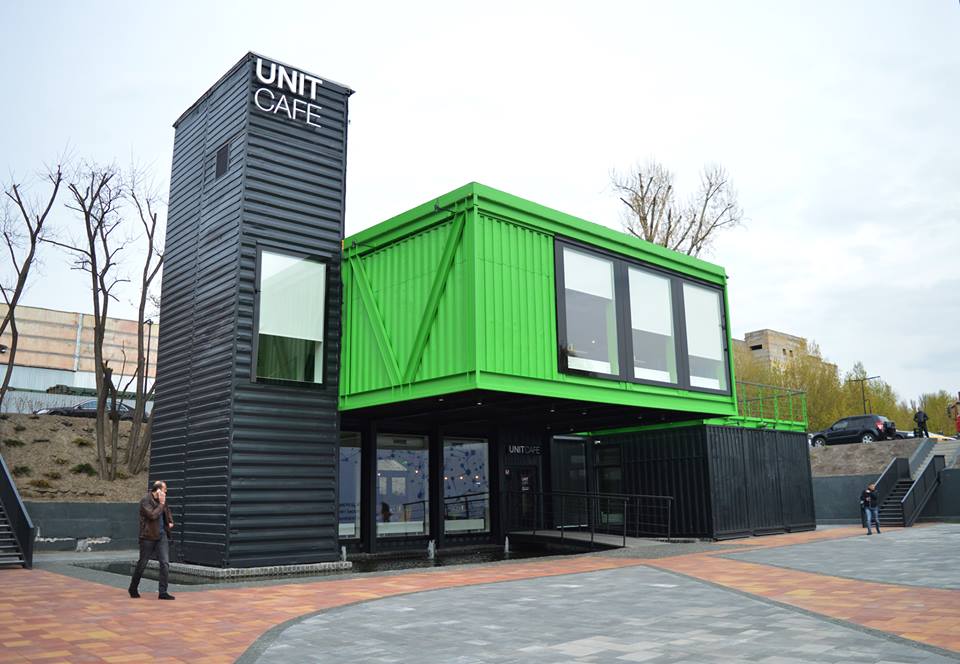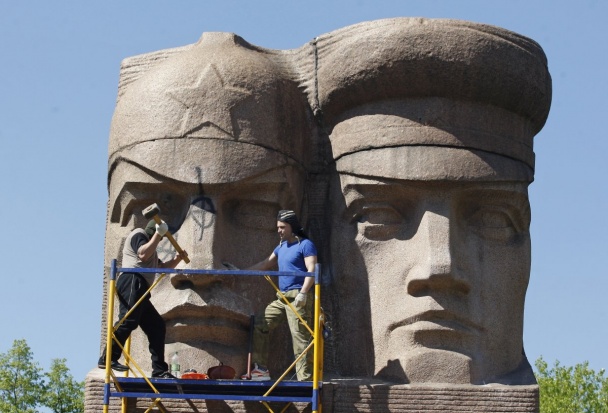The first innovative city, a space with infrastructure for work and living for representatives of innovative businesses, has been opened in Kyiv. It is called UNIT.City and has been set up on the territory of the Motorcycle factory.
So far only 2% of the city is ready. In the next few years it will spread to 25 hectares. The city is completely a private business initiative. Its only investor is Vasyl Khmelnitskyi, an entrepreneur and former politician. He teamed up with managing partners Maksym Yakover and Maksym Bakhmatov, who recently rose to fame by breathing new life into a dilapidated Soviet-style exhibition center in Kyiv, turning it into a modern entertainment park. Both of them see more opportunities in private business than in projects related to the state, like the exhibition center.
Euromaidan Press visited UNIT.City on its Open Doors Day which gathered more than a hundred people. The managing partners themselves organized several excursions through the city. We joined the one led by Maksym Yakover. He started from the UNIT.Factory school, the city's focal point. The team of the UNIT.City is confident that any innovative park should start from an educational institution.
UNIT.Factory (actually, a school)
The school’s first 300 students were selected out of 11,000 based on a competition. They receive a free education which takes 1-3 years and based on the French franchise “42.” There are no teachers. The education process envisions a collaboration between students and creating their own projects. In the end, the organizers expect to see alumni who never stop learning, with knowledge at the level of architects (if talking about developers), and able to solve unusual tasks. The age of the students is 18-30 years. They have 24/7 access to the school. The ultimate condition is to work in Ukraine 3 years after graduation. By the end of the year the organizers expect the number of students to rise to 800.
What is an innovative park
Later at the presentation, Yakover explained the meaning and the mission of the innovative city. Until the mid 80s, he said, business in the world was done in business centers. However, this concept is not relevant anymore. Yakover sneers that no one was told about the change in Ukraine, so business centers are still built here. Later, the concept of science and technology parks was developed. Universities, the main sources of science and innovations, were at their center.
“In the mid-2000s, something changed. The center of the movement shifted towards the youth. Startups and technologies entrepreneurs started to appear. They had totally different requirements to their environment,” explains Yakover.
As told by him, since that time such technologies parks started to be located in centers of the cities. Another type of infrastructure was built for the youth.
“No technological parks were built in Ukraine, and there is no sense in building them now. It’s not relevant anymore. What we built now is an innovative park. The fundamental difference is that an innovative park is about creating the atmosphere. It’s about what makes you think, it’s about the network,” says Yakover.
According to the managing partner, the mission of the park is to put Kyiv and Ukraine on the world map of creative ecosystems.
The size of ambitions
Vasyl Khmelnytskyi is going to spend about $200 mn on the project. What investment risks can the project face in Ukraine? Yakover quotes the main investor:
“On the first presentation in February, Khmelnytskyi said 'I was thinking whether I should invest or not. I thought that when the economy improves, I'll start building. I was waiting and waiting and then thought 'I'll better start the opposite way: to invest first and the economy will improve'.”
Yakover emphasizes that UNIT.City is a private territory which does not depend on the government.

Apart from the school, among its other “residents” is the Ukrainian startup Concepter which created an iPhone case with a flash, the unit Hi Tech Office Ukraine and two labs – Sensorama (on virtual reality) and FabLab Fabricator (on 3D-prototyping).
The city is being created by an international team. For example, Israeli specialists are working on security, British ones - on transport and logistics, Poles do the projecting and Lithuanians consult. Ukrainian specialists were involved in building the school.
It is expected that the city will include the whole set of infrastructure – housing, gyms etc. As now there aren’t that many residents here, the partners organized some things on their own. For example, a cafe.
As Yakover told, for him and like-minded people, the idea of such a park has been up in the air for ten years. He is confident that there are more opportunities than risks for business in Ukraine, and that stimulates him and his partners to create here.




